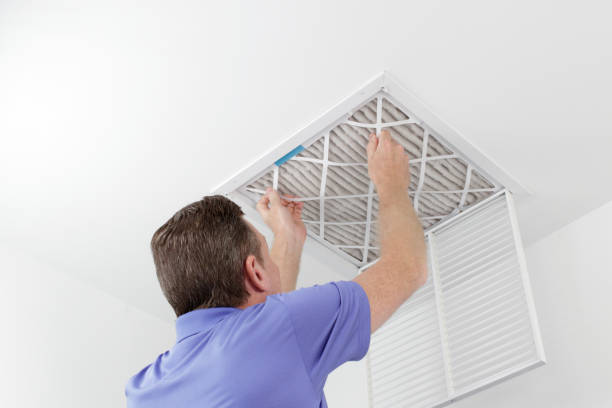HVAC filters might not grab headlines like smart thermostats or high-efficiency heat pumps, yet they are fundamental to both the air we breathe and the efficiency of our home climate control systems. Often overshadowed by more visible HVAC components, filters quietly contribute to a healthier, cleaner living environment and the smooth operation of heating, cooling, and ventilation units. This modest component distinguishes itself through its critical roles in purifying indoor air and safeguarding HVAC equipment from particulate buildup.
Within the realm of HVAC filters, several types stand out: Fiberglass, Pleated, HEPA, and Electrostatic filters, each offering unique benefits. For instance, Fiberglass filters provide a cost-effective, disposable option, while Pleated filters offer improved efficiency and a longer lifespan. HEPA filters are the gold standard for capturing the smallest of particles, and Electrostatic filters excel in attracting and trapping dust and allergens.
Delving deeper, each filter type brings its own advantages to the table in terms of particle capture efficiency, durability, and impact on air flow and system performance. The sections that follow will delve into these attributes, shedding light on the importance of regular filter maintenance and the selection process to enhance indoor air quality and extend the life of HVAC systems. This exploration will offer a comprehensive understanding of why HVAC filters are indispensable to maintaining a comfortable, healthy home.
What are HVAC filters?
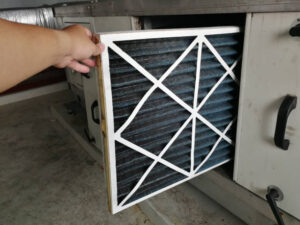
HVAC filters are essential components within your heating, cooling, and ventilation system. Their primary role is to trap and remove dust, pollen, and other pollutants from the air circulating through your home. This not only ensures the air you breathe is cleaner but also protects the HVAC system itself from becoming clogged with debris.
Filters come in various types, including Fiberglass, Pleated, and HEPA, each offering different benefits to meet specific needs. They function by capturing airborne particles through either a mesh of fibers or electrostatic attraction. Keeping your HVAC filter up to date is crucial for maintaining optimal air quality and ensuring your system operates efficiently.
Why are HVAC filters important?
HVAC filters are crucial for two main reasons: improving indoor air quality and protecting HVAC components. By trapping pollutants such as dust, pollen, and pet dander, filters ensure the air in your home is cleaner and healthier, which is particularly important for people with allergies or asthma. Furthermore, these filters safeguard the system by preventing dust and debris from accumulating on the components.
This not only helps in maintaining efficient operation but also extends the lifespan of the system. Regularly changing your HVAC filter is a straightforward measure that significantly enhances air quality and prevents potential system issues, keeping your home comfortable and your HVAC system running smoothly.
Improve indoor air quality by trapping pollutants
HVAC filters play a critical role in capturing airborne pollutants such as dust, pollen, and pet dander. This filtration process significantly improves the quality of indoor air, making it healthier and more breathable. Clean air is particularly important for individuals with allergies or respiratory conditions, ensuring the home environment is safe and comfortable for everyone.
Protect HVAC components from dust and debris
By effectively trapping dust and debris, HVAC filters prevent these particles from clogging the system. This protection is essential for maintaining the system’s efficiency and extending its lifespan. Without a clean filter, the system can suffer from reduced airflow and increased energy consumption, leading to higher utility bills and potentially expensive repairs.
Regular filter maintenance ensures your HVAC system operates optimally, safeguarding against premature wear and tear.
How do HVAC filters work?
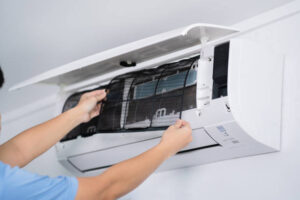
HVAC filters capture particles in the air that circulates through your heating, cooling, and ventilation system by utilizing either mechanical or electrostatic methods. Mechanical filters use a mesh of fibers to physically trap pollutants such as dust and pollen. In contrast, electrostatic filters employ an electric charge to attract and hold onto particles.
This filtration process is crucial for maintaining clean air within your home and protecting the HVAC system’s components from damage. Ensuring these filters are regularly replaced is key to keeping the air quality high and the system operating efficiently.
Trap particles through mechanical or electrostatic means
HVAC filters employ two primary methods to trap particles: mechanical and electrostatic. Mechanical filters utilize a dense mesh of fibers to physically capture pollutants such as dust, pollen, and pet dander as air flows through. On the other hand, electrostatic filters leverage an electric charge to attract and securely hold onto particles, efficiently trapping even the smallest contaminants.
These filtration techniques are essential for purifying the air that circulates through your HVAC system, ensuring a healthier indoor environment and safeguarding the system against debris-related damage.
What types of HVAC filters are available?
There are several types of HVAC filters on the market, each designed to cater to different needs and preferences. Fiberglass filters are widely used due to their affordability and disposability, offering a basic level of air filtration. Pleated filters, with their increased surface area, provide higher efficiency and a longer lifespan, making them suitable for capturing more particles.
For the utmost in air purification, HEPA filters are the top choice, capable of trapping the smallest particles and significantly enhancing indoor air quality. Electrostatic filters also offer a unique advantage, utilizing an electric charge to attract and hold onto dust and allergens. The choice of filter often depends on specific household needs, such as the presence of pets, allergies, or asthma, and the desired balance between cost and performance in improving air quality.
Fiberglass filters: inexpensive, disposable
Fiberglass filters are valued for their cost-effectiveness and ease of disposal. They provide a basic level of air filtration by capturing large airborne particles, making them an accessible option for homeowners seeking straightforward air quality improvement without a significant investment.
Pleated filters: higher efficiency, longer lifespan
Pleated filters are distinguished by their enhanced efficiency and extended lifespan. Their design incorporates more folds, or pleats, increasing the surface area for particle capture. This results in better air purification and a reduced frequency of filter changes, offering a blend of performance and convenience.
HEPA filters: highest efficiency for small particles
HEPA filters represent the pinnacle of filtration technology, boasting the highest efficiency in capturing extremely small particles. They excel in filtering out the finest pollutants, including allergens, bacteria, and virus particles, making them the top choice for households prioritizing superior indoor air quality.
How often should HVAC filters be changed?
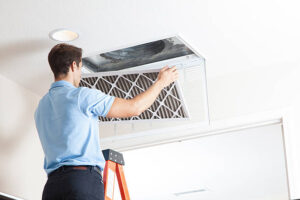
The frequency of changing your HVAC filter varies based on your home’s specific circumstances. For homes without pets, it’s generally recommended to replace the filter every 90 days. Households with one pet should consider changing the filter more frequently, approximately every 60 days, to manage the additional hair and dander.
For homes with multiple pets or individuals with allergies, a more frequent change every 30-45 days is advisable to maintain clean air and alleviate allergy symptoms. Regular filter replacements are a straightforward measure to ensure your HVAC system operates efficiently and keeps the indoor air quality at its best.
Homes without pets: every 90 days
For homes without pets, it’s recommended to change your HVAC filter every 90 days. This routine helps in maintaining a clean airflow and ensures the system’s efficiency, keeping your indoor environment healthy without the extra concern of pet dander.
Homes with one pet: every 60 days
In households that have one pet, changing the HVAC filter every 60 days is advisable. Pets contribute extra hair and dander to the indoor environment, which can quickly clog filters and degrade air quality, making more frequent changes necessary.
Homes with multiple pets or allergies: every 30-45 days
For homes with multiple pets or individuals with allergies, replacing the HVAC filter every 30-45 days is highly recommended. This frequent maintenance schedule is crucial for removing allergens and pet dander effectively, ensuring the air remains clean and helping to alleviate symptoms for allergy sufferers.
Related Reading: How Often Should HVAC Filters Be Changed
How to choose the right HVAC filter?
Selecting the right HVAC filter requires evaluating the MERV rating, which reflects the filter’s effectiveness in capturing various particle sizes. A higher MERV rating signifies greater filtration efficiency, capturing smaller particles. It’s crucial to also consider your household’s specific needs, such as whether there are pets, allergies, or asthma concerns, which might necessitate a higher-efficiency filter.
Additionally, think about the filter’s impact on airflow and your HVAC system’s performance; higher efficiency filters can sometimes restrict airflow more than lower-rated ones. By carefully balancing these considerations, you can choose the HVAC filter that best supports clean air and efficient operation in your home.
Consider MERV rating for particle size efficiency
Evaluating the MERV rating is crucial when selecting an HVAC filter. This rating indicates the filter’s capability to trap particles of varying sizes. Filters with a higher MERV rating are more efficient, capable of capturing smaller particles and thus enhancing the air quality in your home.
Assess household needs: pets, allergies, asthma
Additionally, it’s vital to assess your household’s specific needs. The presence of pets, allergies, or asthma in your household may necessitate a filter with higher efficiency to effectively remove pet dander, pollen, and other allergens from the air. Tailoring your filter choice to these needs ensures the healthiest possible indoor environment.
How to replace an HVAC filter?
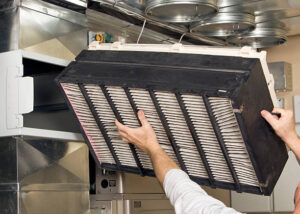
Replacing an HVAC filter is a simple yet crucial task for maintaining your home’s air quality and the efficiency of your HVAC system. First, turn off the HVAC system to ensure safety. Locate the old filter, typically found in the return air duct or the blower compartment.
Remove the old filter, taking note of its size and the direction of airflow, which is usually indicated by arrows on the frame. Purchase a new filter that matches the old one’s size and meets the recommended MERV rating for your system. Finally, insert the new filter correctly, ensuring it fits snugly and the airflow arrows point in the right direction.
Regularly replacing your HVAC filter is key to keeping the air in your home clean and your system running smoothly.
Turn off HVAC system
First and foremost, turn off the HVAC system. This step is essential for safety and prevents the spread of dust and particles during the filter change process.
Locate and remove the old filter
Next, locate the old filter within the HVAC system, typically found in the return air duct or close to the air handler. Carefully remove the old filter, noting its size and the airflow direction, indicated by arrows on the frame. This information is crucial for correctly installing the new filter.
Insert the new filter correctly
Finally, when placing the new filter, ensure it is oriented correctly, with the airflow arrows aligned with the system’s airflow direction. Insert the new filter firmly to eliminate any gaps, securing optimal air filtration and maintaining the efficiency of your HVAC system.
What are common problems with HVAC filters?
Among the issues faced with HVAC filters, clogged filters are a primary concern. This problem leads to reduced airflow and a drop in system efficiency. When filters are overly dirty, they can’t trap additional particles, forcing the HVAC system to work harder, which may result in higher energy costs and premature system wear.
Another common issue is the use of an incorrect size filter, causing a poor fit that allows air to bypass the filter entirely. This compromises air quality and can harm the HVAC system. Furthermore, overlooked filter changes significantly impact the system’s lifespan and the quality of indoor air, as maintaining a steady flow of clean air is essential for the system’s optimal performance and for ensuring a comfortable home environment.
Clogged filters leading to reduced airflow and efficiency
Clogged filters significantly impact HVAC performance, leading to reduced airflow and diminished efficiency. As filters accumulate dust and debris, their ability to trap new particles weakens, compelling the system to exert more effort. This not only increases energy usage but may also hasten wear and tear on system components.
Incorrect size causing poor fit and air bypass
An incorrectly sized filter can cause a poor fit, allowing air to bypass the filter. This situation undermines air quality by permitting unfiltered air, along with dust and allergens, to circulate freely. It also poses a risk to the HVAC system itself, as debris can enter and damage sensitive parts, affecting overall performance and durability.
Overlooked changes reducing system lifespan and air quality
Overlooked filter changes are a critical oversight that can shorten the lifespan of the HVAC system and degrade indoor air quality. Failure to replace dirty filters leads to an accumulation of airborne contaminants and places additional strain on the HVAC system. This can result in premature system failure and necessitate costly repairs, underscoring the importance of regular filter maintenance for efficient operation and a healthy living environment.
In Summary
At Callidus Air, we understand the importance of a well-maintained HVAC system, starting with the right HVAC filters. By choosing us, you ensure that your home or business benefits from high-quality air filtration, which not only improves indoor air quality but also extends the lifespan of your HVAC equipment. Trust Callidus Air to provide expert advice and reliable products to meet all your HVAC needs.
Contact us today to explore our range of HVAC filters and find the perfect fit for your system!

